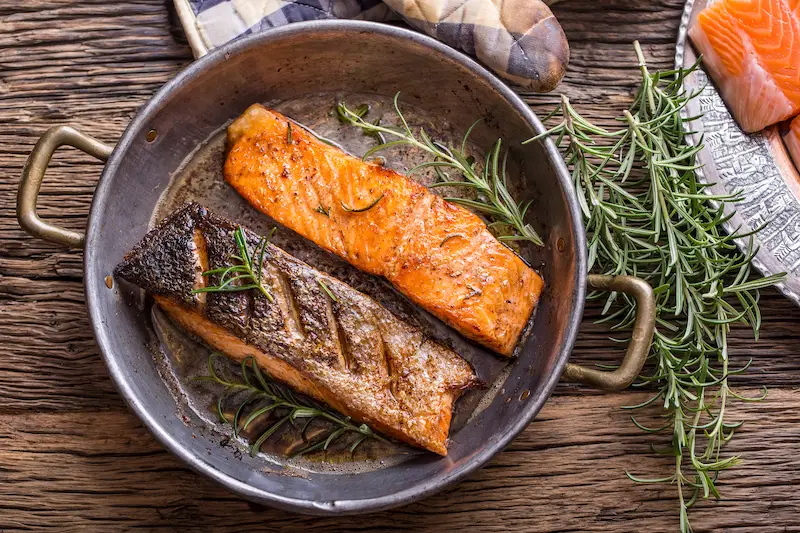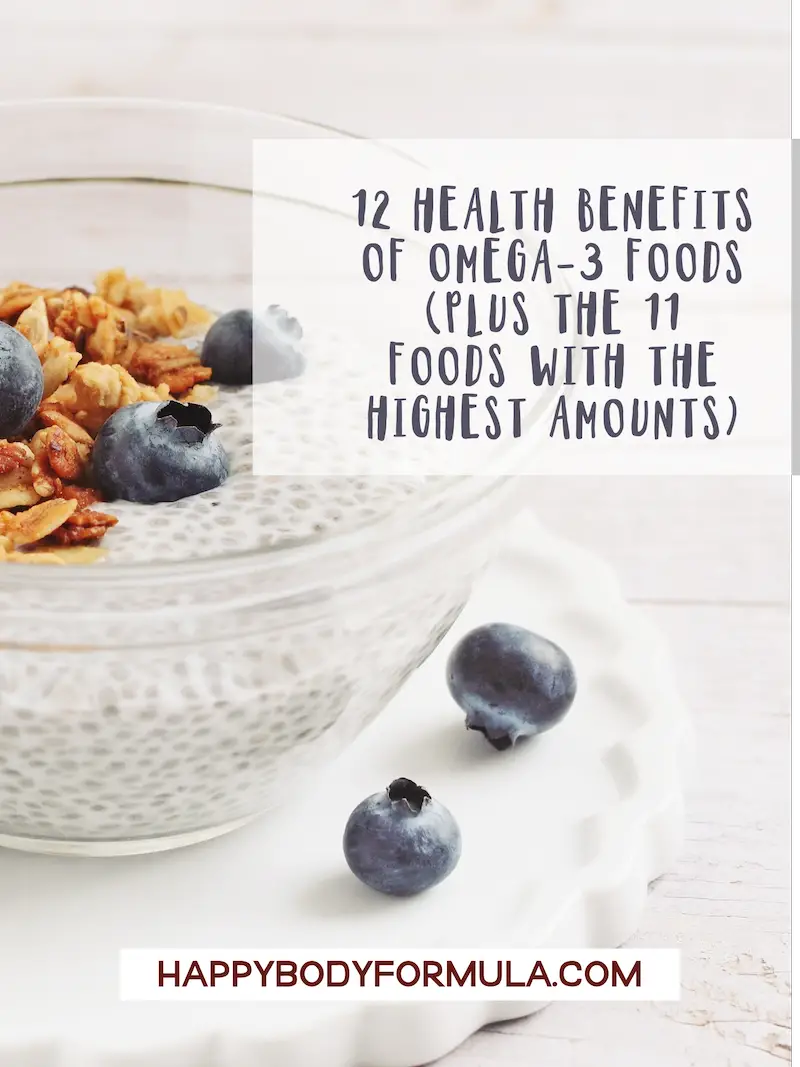
Omega-3 fatty acids are anti-inflammatory fats with impressive health benefits. But you don’t have to take fish oil supplements to get these — you can get all the omega-3s you need from food!
So what are the health benefits of omega-3 foods (and which foods have the highest amounts)? We’ll dive deep into how you can support health by eating these foods.
What Are Omega-3 Fatty Acids?
Omega-3 fats are essential fatty acids that perform vital roles in human bodies. They are also known as polyunsaturated fats, which refers to their chemical structure of multiple double bonds.
Omega-3 fats help the human body function as it should, from the nervous system to the immune system and virtually everything in between.
There are three types of omega-3 fats: ALA (alpha-linolenic acid), DHA (docosahexaenoic acid), and EPA (eicosapentaenoic acid). While DHA and EPA are commonly found in animal foods and some types of algae, ALA is primarily found in plant-based food sources.
12 Health Benefits of Omega-3 Foods
Omega-3s have wide-ranging health benefits. They are considered to be essential fatty acids because our body cannot make them, therefore, we must get them from dietary sources.
Protect Heart Health & Reduce Stroke Risk
The top two causes of death worldwide are heart attacks and strokes. People who consume higher amounts of omega-3 fats reduce their risk of these because omega-3s are highly protective of heart health, reduce inflammation, lower triglycerides, reduce blood pressure, decrease blood clotting problems, and protect the arteries from accumulating plaque.
Support Mental Health, Fight Depression, & Reduce Anxiety
Depression and anxiety are common disorders of the brain that strongly affect quality of life, producing symptoms like sadness, loss of interest, lethargy, panic attacks, worry, and sleep problems.
Much research points to omega-3s as a critical nutrient for depression and anxiety prevention or improvement, as those who regularly consume adequate amounts are less likely to be depressed or anxious.
Out of the three types of omega-3s, EPA is the one most associated with a reduction in depression symptoms, and in some cases, is as effective against depression as certain antidepressant medications.
Reduce Symptoms & Development of Autoimmune Disease
Autoimmune disease happens when cells in the immune system get a wrong message and start attacking its own body tissues, instead of foreign invaders like viruses or bacteria.
There are more than 100 autoimmune disorders, with several common types being rheumatoid arthritis, multiple sclerosis, type 1 diabetes, Hashimoto’s thyroiditis, and lupus.
Omega-3 fatty acids can help the body avoid developing autoimmunity, and even when you already have existing disease, it can help to treat it and reverse symptoms associated with inflammation, pain, and fatigue, among others.
Support Eye Health & Vision
The retina of the eye is composed partly of DHA, an omega-3 fatty acid. Without enough dietary DHA, eye and vision problems can develop.
Eating enough in the diet or taking omega-3 supplements can help to defend against macular degeneration, the top cause of blindness and eye damage.
Reverse Metabolic Syndrome & Type 2 Diabetes
Metabolic syndrome is a grouping of symptoms that collectively increase the risk for diabetes, heart disease, and stroke. It includes factors like excess abdominal fat, high blood pressure, low HDL cholesterol, insulin resistance, excess glucose, and high triglycerides.
Omega-3 fats help to decrease inflammation, improve insulin resistance, and lower heart disease and stroke risk factors.
Decrease Inflammation Levels
Omega-3s are so health-protective because they lower inflammation throughout the body. This is how they decrease disease risks and how they also work to treat and reverse disease conditions.
Omega-3s specifically work to lower inflammation by reducing the number of inflammatory molecules in the body, like cytokines. The closer your omega-3 intake is to optimal, the lower your chances of having inflammatory or disease-associated problems.
Alzheimer’s Prevention & Protection for Cognitive Function
Omega-3 fats help to promote brain health and can reduce the risk of developing Alzheimer’s and dementia. They do this by helping to protect the brain from inflammation and the influence of too much glucose, which can affect how brain cells work.
Omega-3 fatty acids have to be consumed regularly since we don’t make them in our bodies and we need them in regular doses for protective benefits.
Can Help to Reduce Risk of Certain Types of Cancer
Omega-3 fatty acids have such potent health benefits that they can reduce the risk of certain types of cancer, including colon cancer, prostate cancer, and breast cancer.
While more research is needed to explicitly understand protective effects, optimizing omega-3 intake levels is so widely protective that it should be considered a basic way to protect general health, including against potential for cancer.
It has not been used as a way to treat cancer, however, other than to help reduce inflammation from side effects of treatments.
Protects Liver from Damage
The liver isn’t just subject to damage from alcohol intake. In fact, non-alcoholic fatty liver disease, or NAFLD, is increasingly common thanks to the poor nutrition of modern, fast food diets.
It is associated with obesity, and when the liver becomes burdened with fat deposits, it is less efficient at detoxing the body and providing protective effects. Omega-3 fats can help to reduce inflammation, decrease fat in the liver, and protect against disease.
Joint & Bone Health
Joint pain is increasingly common and is associated with conditions like osteoarthritis and rheumatoid arthritis. Osteoporosis is also a common disorder that occurs when the bones become fragile due to a lack of protective minerals.
Omega-3 fatty acids can protect both joint and bone health by boosting calcium for the bones and by reducing the inflammation associated with arthritic pain.
Boost Sleep Quality
Without healthy sleep, overall wellness suffers. Omega-3 fats can help to improve sleep quality by boosting the natural hormones that create a healthy sleep cycle, like melatonin.
Low levels of protective omega-3 fats are also associated with sleep apnea and insomnia, so boosting dietary intake of omega-3s can have a dramatic impact on sleep problems and disorders.
Improve Skin Health
The skin is comprised of multiple layers of epidermis, and in order to have healthy skin, we need to have well-nourished and hydrated cell membranes.
EPA in particular promotes health, supple, moisturized skin because it helps to maintain a healthy oil balance, reduces risk of acne problems, and keeps early signs of aging at bay. It’s also helpful for protecting the skin from sun damage, since EPA prevents excessive loss of collagen from the skin.
11 Foods That Are Highest in Omega-3 Fats
In order to meet your daily requirements for omega-3 fats, you need to eat around 500 milligrams daily, though this number could be higher if you have chronic or inflammatory conditions already.
Here are the top 11 foods highest in omega-3 fatty acids.
Mackerel
Mackerel is a type of fatty fish that are typically smoked or eaten as fillets. A 100-gram (3.5 ounces) serving contains 5,134 milligrams of omega-3s, and also happen to be rich in vitamin B12 and selenium.
Mackerel pairs well with any vegetable, and is delicious when roasted and paired with lemon, herbs, and butter. Try cooking this Mediterranean version.
Chia Seeds
Chia seeds are nutrient dense that provide minerals and other nutrients, not the least of which is omega-3 fatty acids. They contain 4,915 milligrams of omega-3s per a one-ounce serving.
Chia seeds absorb a high amount of water and are also a great way to hydrate the body. You can use them to make a variety of foods, but chia pudding is a delicious and versatile option.
Cod Liver Oil
While cod liver oil is technically a supplement, since it comes in liquid form instead of capsule, it’s often viewed more as a food source.
It contains 2,664 milligrams of omega-3s in just a single tablespoon, and is also loaded with vitamin A and vitamin D (of which there are few food sources). Don’t excessively eat cod liver oil, however, as too much vitamin A can present its own set of problems.
When taking cod liver oil, be sure to choose a brand that is pure and has high manufacturing practices.
Walnuts
Walnuts are a rich source of fiber, copper, vitamin E, manganese, and more — but they’re also a loaded source of omega-3 fats. One serving of about 7 walnuts contains 2,542 milligrams of omega-3s.
You can eat walnuts plain or you can use them to make a huge variety of delicious recipes, ranging from things like walnut-crusted chicken to basil walnut pesto, with desserts, breakfasts, and just about everything else in between.
Flaxseeds
Flaxseeds are tiny brownish seeds that are typically ground and used for things like smoothies and baking. They’re richest in ALA, a plant-based form of omega-3 fatty acids.
They are also loaded with fiber, magnesium, vitamin E, and are easy to work into a diet, especially for people who struggle to eat seafood.
A tablespoon of flaxseeds contain 2,338 milligrams of omega-3s. You can use flax to make cookies, bread, smoothies, and more. The next time you want to bump your omega-3 levels, try making zucchini fries or blueberry flax muffins.
Salmon
Salmon is probably the most popular source of omega-3s, and contains 2,260 milligrams in a 3.5 ounce serving. It’s also a great source for magnesium, potassium, B vitamins, and selenium.
Salmon can be prepared in numerous ways, from baking to grilling to eaten raw in sushi. However you choose to eat it, making it a regular part of your diet can help to boost your overall omega-3 levels and have a protective effect on your health. Try this garlic butter baked salmon the next time you prep it for dinner.
Anchovies
Anchovies, like sardines, are often found in cans, and are typically eaten in smaller portions as toppings for dishes like pizza, salads, or stuffed mushrooms. You can also use them to stuff olives or make dressings and marinades.
Anchovies are a rich source of selenium and calcium, along with niacin and selenium. A 3.5 ounce serving provides 2,113 milligrams of omega-3 fatty acids, too.
Try using anchovies to make side dishes like anchovies with zucchini, asparagus, and cauliflower.
Herring
Herring is an oily fish that is often smoked or canned, making it an easy to grab snack. A 3.5 ounce serving of herring contains 1,729 milligrams of omega-3 fats, as well as nearly 100 percent daily needs for vitamin D and selenium, as well as half the daily requirement for vitamin B12.
For a change of pace, try making fried herring fillets with a lime pepper crust. Even people who don’t like seafood will find this dish delightful.
Sardines
While sardines seem to elicit a less-than-enthusiastic response from most, they’re a surprisingly delicious fish that is jam-packed with nutrients.
A 3.5 ounce serving contains 1,480 milligrams of omega-3s, and plenty of vitamin B12, vitamin D, and selenium. Sardines, when eaten with the bone, are also a potent source of dairy-free calcium.
Prepare sardines in delicious ways, like by baking them or grilling them.
Caviar
While you’re probably not eating caviar every day, when you do, you can know that you’re boosting your omega-3 levels. A tablespoon-sized serving of caviar contains 1,086 milligrams of omega-3 fats, and is also a rich source of choline.
Oysters
Ever tried oysters? They’re a great source of omega-3s, zinc, vitamin B12, and copper. A single 3.5 ounce serving provides 672 milligrams of omega-3 fatty acids.
While that seems low compared to mackerel or salmon, remember that the recommended daily amount to meet basic needs is just 500 milligrams, so even oysters are a loaded source.
If you’ve never tried them before, start with a basic grilled oysters recipe.

Aimee McNew, MNT, CNTP, is a certified nutritionist who specializes in women’s health, thyroid problems, infertility, and digestive wellness. She ate her way back to health using a Paleo diet, lost 80 pounds, and had a healthy baby after numerous miscarriages. She focuses on simple nutrition practices that promote long-lasting results.

